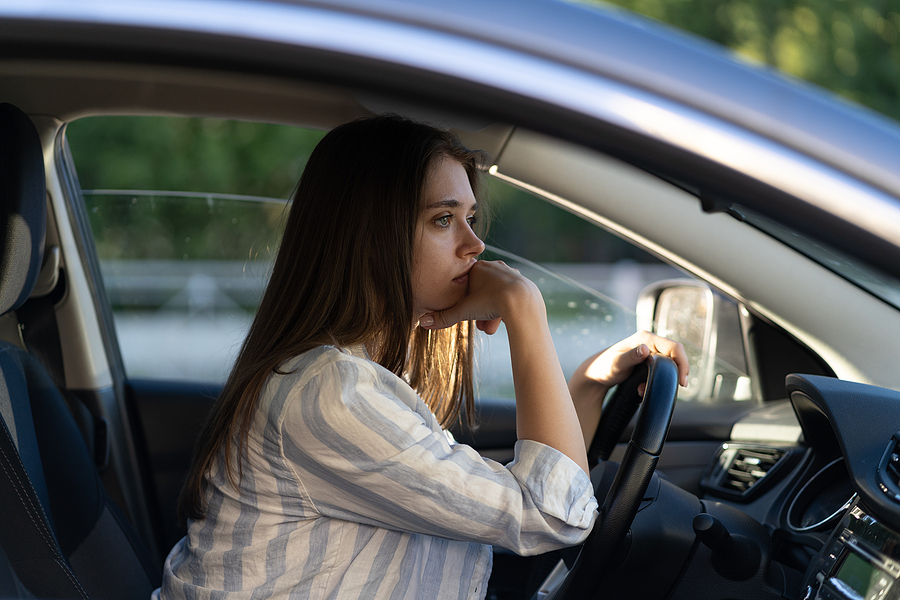Fear of driving is real, and it’s terrible. Even if you didn’t suffer a severe injury in a car accident, you may feel so anxious behind the wheel that driving seems impossible. This feeling is nothing to be ashamed of – it happens to many people. You’ve gone through an incredibly traumatic event, and it’s going to take some time to regain your confidence.

The attorneys with Sand Law want you to know that you’re not alone. You can take steps to get back behind the wheel so you can live life to its fullest. We’ll be here if you want our firm to pursue compensation from those to blame for the wreck. Our attorneys will walk you through every step of your case, so you know what to expect at all times.
If you want a free consultation, call 651-291-7263 or contact us online.
Common Mental Health Issues After Car Accidents
Not only can car wrecks result in severe physical injuries, but they can also cause a great deal of mental trauma. Three of the most common issues are PTSD (post-traumatic stress disorder), anxiety, and depression. Here’s a quick look at each.
- PTSD – If you continually have bad dreams about the accident and have a hard time driving, you could have PTSD. People commonly develop this condition after a traumatic, near-death experience. As a result, they will typically have intrusive thoughts. They might find themselves trying to avoid anything that reminds them of the accident.
- Anxiety – The human body normally triggers changes to the nervous system during a terrifying event such as a car accident. These include heart rate, blood pressure changes, and others that are part of the body’s “fight or flight” response. While they can be healthy during the event, when these changes don’t subside, that becomes a problem. The body may continue to exhibit these responses even when the victim is in the passenger seat, and the car passes the accident scene.
- Depression – A car accident can sometimes lead to feelings of helplessness and constant negative emotions. Depression can also lead to feelings of guilt or even shame. They can be so powerful that the victim can’t function normally – much less try to drive a car.
Signs of Emotional Distress After a Car Accident
There are a lot of indications that you might suffer from PTSD, anxiety or depression associated with your car accident. If you’re experiencing any of the following, please consider getting treatment.
- Shaking or trembling
- Chest pain or a rapid heart rate
- Feeling detached from yourself or feeling that you don’t have any control
- The constant fear of dying
- Choking or difficulty breathing
Can I Claim Anxiety After a Car Accident?
Yes, you can. This is a form of damages, or monetary losses that you’ve incurred due to the accident. Anxiety is emotional distress, and you may be able to obtain compensation for it. Emotional drama is just as compensable as lost wages or medical bills.
You’ll more than likely need to be diagnosed with anxiety or whatever another type of disorder you suffer from because of the wreck. That means you’ll need to see a psychiatrist. But don’t do this just for your case – do it because it can help you get back to normal.
Learning How to Cope with the Fear of Driving
It might seem that you’ll never again be able to drive. But there is hope. Talking to a mental health professional could be exactly what you need to get back behind the wheel with 100% confidence. In the meantime, try to keep the following in mind.
- The essential thing is not to be ashamed of the feelings you’re experiencing. Don’t try to keep them to yourself. Talking to people who genuinely care about you could help reduce your anxiety and fear. It could also help clear your mind of those negative thoughts for good.
- If you’re ready to try driving again, fantastic. Just make sure you have someone with you to be on the safe side. That person can take over if you start feeling overwhelmed.
- Also, start slow, with short drives. Keep those drives limited to your immediate neighborhood to start. Then, as you start feeling more confident, drive a little farther away from home.
When Should You Get Help for Emotional Distress After a Car Accident?
If you’ve tried the above and you’re still hesitant to drive, then it might be time to consider getting the help of a mental health professional. This will especially be true if you’re having difficulty sleeping, you’ve lost your appetite, or you’ve lost the will to get on with your life. There’s absolutely no shame in seeing someone – it could make all the difference in the world.
Receiving Compensation for Your Fear of Driving
It would help if you also considered speaking to an attorney as soon as possible. The reason time is of the essence is that your lawyer will have to investigate the accident. This investigation will help them get the proof it will take to prove your case. Once you have that proof, you can get the money you deserve for all the physical and emotional suffering you’ve endured.
There are a lot of factors that go into determining how much compensation you’ll receive. From a physical perspective, the more severe your injury, the more you’ll likely get. It’s not that difficult to prove physical damages – emotional damages are another matter. It takes the skill of an experienced attorney to be able to calculate these so-called “non-economic” damages accurately.
Contact Sand Law to Speak with an Attorney About Emotional Distress After a Car Accident
The attorneys with Sand Law have experience working with those who developed a fear of driving after their accident. The legal experts with our firm can provide an accurate calculation of all your damages. We can also gather the evidence needed to show the insurance company exactly how much you deserve.
Learn more by contacting us online or calling 651-291-7263 for a free case review.

